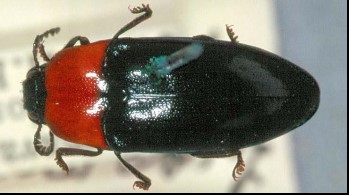MIAMI – U.S. Customs and Border Protection (CBP) Office of Field Operations (OFO) agriculture specialists at the Miami Seaport intercepted an unusual pest identified as Lissomus sp. in the family Elateridae during an intensive inspection of a container of ginger from Ecuador. The U.S. Department of Agriculture (USDA) confirmed this week that this marks the first nationwide interception of this pest.
Insects in the family Elateridae are commonly known as click beetles because of their unusual click mechanism. A spine in their prosternum can be snapped into a corresponding notch, producing a violent “click” that can bounce the beetle into the air. Clicking is mainly used to avoid predators. Some of their larvae, known as wireworms, are potentially harmful agricultural pests feeding off decaying vegetation and roots of plants.
“Finding a first-in-nation pest is an exceptional achievement and our CBP agriculture specialists work hard every day, searching hundreds of containers of many different commodities, to detect and prevent dangerous pests from entering the U.S. and destroying agricultural resources,” said Miami Seaport Port Director Diane Sabatino.
CBP agriculture specialists are the first line of defense in the protection of U.S. agriculture, forest, and livestock industries from destructive plant pests and animal diseases. They are highly trained and experienced in biological sciences and inspection techniques used to detect biological threats. Each year, CBP agriculture specialists intercept tens of thousands of “actionable pests” – those identified through scientific risk assessment and study as being dangerous to the health and safety of U.S. agricultural resources.
See more CBP activity in Florida on the @CBPFlorida Twitter page.


